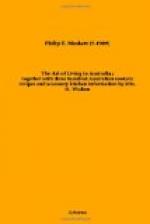But under all circumstances, whether brain or muscle be employed by the bread-winner, a substantial breakfast is of first-rate importance. There is one form of food which it is especially necessary should constitute part of the meal, and which must be referred to. This is that variety known as the hydro-carbons or fats. The value of fat, in any of its many forms, in promoting the health of the body and preventing the onset of wasting diseases is hardly appreciated, and besides this action it markedly serves to nourish the brain and nervous system. Dr. Murchison, the late eminent physician, was wont to declare that bacon fat or ham fat was worth a guinea an ounce in the treatment of wasting diseases. Cod liver oil, also, has a wide repute in the treatment of the same class of maladies. Indeed, it is related of an eminent barrister that he used to take a full dose of cod liver oil some time before going to plead an important case, for he found it better brain food than anything else.
In our semi-tropical climate, however, a dislike is often taken to butter when it is presented at breakfast in the form of semi-liquid grease. It would require a person with the stomach of an ostrich to digest, to say nothing of relish, such an oleaginous compound during our hot months. But if this necessary and all-important article of diet can be presented in an appetising shape, what a desirable result is achieved I The mass of the people—I am not referring to those who are well endowed with worldly gifts—are apt to look upon the ice chest as a luxury which is altogether beyond their means. But, as I have said elsewhere, I am firmly persuaded that if the price of ice were brought down to one-halfpenny per pound, and if a company were formed to deliver such a small quantity as six pounds per day, or every second day, it would be a great boon, and moreover a wonderfully profitable speculation. A very small and suitable ice chest could be constructed, to sell at a few shillings, solely to preserve the butter in a congealed, and therefore palatable, state, for children as well as for adults. The former would take it with great avidity, and the benefit to health resulting therefrom would be incalculable. Even in some of the better-class houses ice is looked upon too much as a luxury, and not, as it should be, a necessity; indeed, the money saved from gas during the summer months might well be expended in ice.




